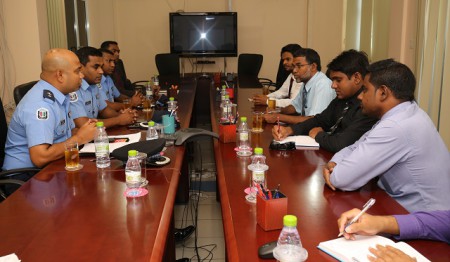The ongoing nightly protests by the opposition ‘Alliance against brutality’ are not peaceful, police have declared, claiming protesters were assaulting police officers and planning to carry out acts of arson in Malé.
At a press briefing on Thursday (March 26), Chief Superintendent of Police Abdulla Nawaz said speakers at the demonstrations were inciting violence and that protesters have repeatedly broken through police lines, disobeyed police orders, and obstructed police duty.
Protesters have also “thrown rocks, glass and lead balls at police ranks,” and attempted to cause physical harm to police officers, he alleged.
During the past two nights (March 24 and 25), Nawaz claimed that speakers “openly” called for subverting peace and security, and “encouraged breaking laws and regulations.”
Nawaz warned that police would disperse protests “without further warning” if protesters attempt to forcibly enter barricaded zones.
Moreover, a decision has been made to disperse protests after prior warning “if any unlawful actions take place to any extent during protests after Saturday night, or if we see such actions are about to take place,” he warned.
The nightly protests first began after the opposition Maldivian Democratic Party (MDP) and Jumhooree Party (JP) allied against the government’s alleged breaches of the constitution on February 12 – two days after the arrest of former Defence Minister Mohamed Nazim on charges of weapons possession. Tensions escalated further with the arrest of former President Mohamed Nasheed on February 22.
Following Nasheed’s conviction on terrorism charges on March 13, the MDP accepted an invitation by Adhaalath Party (AP) President Sheikh Imran Abdulla to form a united front against the government’s “brutality” and continued protests this week under the banner “Alliance Against Brutality.”
Shortly after the police press conference, the Elections Commission (EC) announced that it has fined the MDP and AP for allegedly attacking police officers, damaging private property, and inciting violence in violation of laws governing freedom of assembly and political parties.
The MDP and AP were fined MVR47,000 (US$3,047) and MVR33,000 (US$2,140), respectively, and ordered to pay the fine within seven days.
In a letter to the parties, the EC warned that further action would be taken if “such actions are repeated in protests conducted by the parties”.

Peaceful assembly
Nawaz meanwhile claimed that individual police officers have been confronted and intimidated at their homes, adding that efforts were underway to “psychologically weaken” police personnel.
Police vehicles and private property have also been damaged, he added.
Nawaz revealed that 162 protesters have been arrested so far and police have forwarded cases involving 95 protesters, including two MPs, to the Prosecutor General’s Office.
The Criminal Court has also released 62 protesters on the condition that they do not participate in protests for a determined period. Of these, two have subsequently been arrested for attending protests.
Nawaz said the 2013 Freedom of Assembly Act requires protests to be held to achieve a peaceful purpose and be free of violence or any form of incitement to violence.
He noted that the opposition alliance had not notified police prior to any of the nightly protests, which he said has prompted complaints from the public and businesses due to blocked roads and disruptions to public order and safety.
Nawaz also accused certain media outlets of attempting to falsely portray police as brutal towards civilians and said the media cut off live feed when protesters attacked police officers. He warned the police would arrest media personnel if they obstruct police duty.
If police officers violated the law during protests, Nawaz invited political parties and the public to lodge complaints at the relevant oversight bodies.
Meanwhile, at a separate press briefing on Wednesday, Chief Superintendent of Police Ismail Naveen said police intelligence has learned of planned acts of arson and other plots to “create fear in the hearts of the people.”
The recent spike in violence against expatriates – which saw two Bangladeshis murdered and four expatriates stabbed this week – was “planned”, he said.
According to police media, Naveen met officials of the EC, Police Integrity Commission, and Human Rights Commission of Maldives on Thursday in “emergency meetings” held to share concerns regarding “turmoil on the streets of Malé planned and carried out by political parties” and discuss counter measures.
Businesses in the capital were facing “irrevocable economic losses” due to the protests and police resources were diverted from law enforcement, Naveen told the independent commissions.
If protesters use loudspeakers after 11:00pm and continue protests after 12:00am in defiance of orders by police – invoking powers under the freedom of assembly law – Naveen said police were considering “not allowing the opportunity to continue these gatherings”.
Related to this story:
MP Mahloof, Raajje TV journalists among nine arrested from opposition protest
“We will secure our rights from the street,” says Sheikh Imran
Government should initiate discussions or face consequences, warns opposition
Gasim “economically paralysed,” says JP Deputy Leader
Former bitter rivals unite against “brutality” of President Yameen’s government
